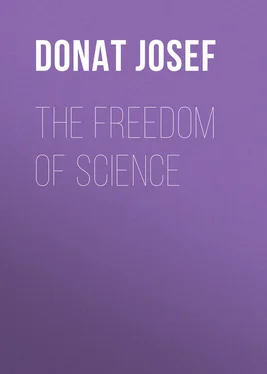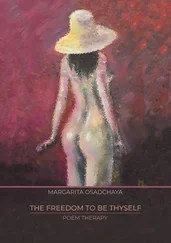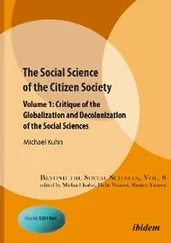Josef Donat - The Freedom of Science
Здесь есть возможность читать онлайн «Josef Donat - The Freedom of Science» — ознакомительный отрывок электронной книги совершенно бесплатно, а после прочтения отрывка купить полную версию. В некоторых случаях можно слушать аудио, скачать через торрент в формате fb2 и присутствует краткое содержание. Жанр: foreign_antique, foreign_prose, на английском языке. Описание произведения, (предисловие) а так же отзывы посетителей доступны на портале библиотеки ЛибКат.
- Название:The Freedom of Science
- Автор:
- Жанр:
- Год:неизвестен
- ISBN:нет данных
- Рейтинг книги:4 / 5. Голосов: 1
-
Избранное:Добавить в избранное
- Отзывы:
-
Ваша оценка:
- 80
- 1
- 2
- 3
- 4
- 5
The Freedom of Science: краткое содержание, описание и аннотация
Предлагаем к чтению аннотацию, описание, краткое содержание или предисловие (зависит от того, что написал сам автор книги «The Freedom of Science»). Если вы не нашли необходимую информацию о книге — напишите в комментариях, мы постараемся отыскать её.
The Freedom of Science — читать онлайн ознакомительный отрывок
Ниже представлен текст книги, разбитый по страницам. Система сохранения места последней прочитанной страницы, позволяет с удобством читать онлайн бесплатно книгу «The Freedom of Science», без необходимости каждый раз заново искать на чём Вы остановились. Поставьте закладку, и сможете в любой момент перейти на страницу, на которой закончили чтение.
Интервал:
Закладка:
If science, then, can only with difficulty lift from visible nature the veils that hide the truth – and even this is often beyond its power – no wonder it is confronted with still greater obstacles when it approaches the truths that are beyond visible nature. Moreover, it is an old truth that here it is led not by reason only, but also, and even more energetically, by self-interest. “Most men,” says Cicero , “are swayed in their judgments by either love or hatred, likes or dislikes” (De Oratore, II, 42).
If this is the nature of human science, its adepts would be badly deceiving themselves, if, in the pride of learning, they would reject every correction, even proudly pushing aside the hand of God that reaches down into the darkness of man's intellectual life to offer its guidance. He who realizes that he is in danger of losing his way in the dark, will not reject a reliable guide; and he who fears to stumble will not refuse a helping hand. Self-knowledge is the sister of wisdom, and the mother of modesty.
Freedom
Such, then, is science: not the goddess that emanated from the head of immortal Jove, but the offspring of the puny mind of man, bone of his bone and flesh of his flesh. And this science cries for freedom. It would be free and act freely; it urges its claim in the name of truth, which must not be slighted; in the name of the progress of civilization, which must not be hindered.
Freedom clearly means nothing less than to be untrammeled and free from restraint, from fetter and check, in action, thought, and desire. The prisoner is free when his chains drop off, a people is free when it has cast off the yoke of serfdom, the eagle is free and can spread out its wings in lofty flight when not bound down to the earth. Science, therefore, should be free in its activity from bond, fetter, and restraint. Does this mean it must be free from all restraint and law? Should the historian be given the right to make Solon a member of the French Academy, or of the heroes of Troy mediæval knights? Should the scientist be given the right to break every rule of logic, to ignore all progress, and perhaps in his capriciousness return to the four elements of Aristotle , or the astronomical chart of primitive ages? Nobody demands this. No, science must be bound by the truth . Freedom indeed should not mean lawlessness. Science remains bound by the general laws of logic, and by positive facts. Truth is the irremovable barrier set in restraint of the freedom of everything, even of scientific thought. The freedom of science therefore can only be freedom from unreasonable restraint and fetters; from such that hinder it unreasonably in its inquiry after the truth, and in the communication of the results of its investigation. It should be free, not from the internal bondage of truth, but from the restraint by external authority , the restraint which would hinder it, in an improper way , from approaching those questions, and using those methods, that lead to the discovery of truth, and from acknowledging the results it has found to be true; or which would unlawfully keep it from making known, for the benefit of others, the results of its investigation. It should be free from any unjust restriction, imposed by state or Church, by popular opinion, by party spirit, by hampering protectorate, or servility of any kind.
From any unjust restriction, we said. For this is clear: if under certain circumstances there might be warrant for a just restriction by external authority, such a restriction could not be refused in the name of freedom. So long, then, as we understand by freedom a lawful freedom, there cannot be included in this the freedom from every external authority, but only from unlawful interference. There is, then, the question whether there may be a legitimate restraint, imposed by external authority, which man must not evade, and what the nature of such restraint may be.
We must, moreover, take into consideration two elements, which are distinguished in the above definitions, both belonging to the modern idea of scientific freedom. We will call them freedom of research , and freedom of teaching . The investigator and the scientist claim the one; the teacher, the other. Searching after truth, and communicating the truth found, are, as is known, the principal occupations of science. The scientist should first of all be an investigator. He should not be content to appropriate to himself the knowledge of others, he should also make his own additions to knowledge. He is also commonly a teacher, by word of mouth, as at the university, or by his writing, in his literary activity. Research, as such, imparts directly a certain knowledge only to the investigator; it is of a private nature and as such does not reach beyond him. But by teaching, his ideas are communicated to others, and then begin to influence their thought, will, and action, often very strongly. Teaching is a social factor; with it are bound up the weal and woe of others. Suppose a man of influence conceives in his study the idea that monogamy is an infringement upon the universal rights of man; should he be given without any ado the right of disseminating, by teaching, the imagined results of his investigation, to the confusion of men, and with serious danger to the peace of society?
We shall therefore have to distinguish between freedom of research and freedom of teaching. The neglect of this distinction causes not a little confusion; thus, if one complains of his convictions being trammeled or his liberty of conscience being violated, when he is hindered from immediately proclaiming whatever he calls his convictions. Private opinion, and the public propaganda of this opinion, are evidently very different things. It may be that an opinion seems to me the right one, but, in spite of that, public dissemination of it may, always or under certain circumstances, mean danger to my fellow-men. If I am for this reason prevented from publishing it, I am not thereby hindered from giving it my own private assent. It is, moreover, quite clear that the state – we disregard here religious authority – cannot at all directly restrict research, which is something personal. It can only impose restrictions on the communication of one's ideas by teaching them to others, which is a social function.
From these few remarks will be followed the impropriety of the following, or similar, observations: “The fostering of science and its teaching are not separate functions … to insinuate a twofold function of freedom, viz., that of the savant and that of the teacher, would be to dissolve the unity of the moral personality” ( W. Kahl , Bekenntnissgebundenheit und Lehrfreiheit (1897), 22). It is not at all double-dealing if some one does not publicly proclaim one's private knowledge. Is it double-dealing, is it a violation of “the unity of the moral personality,”if one is, and must be, silent about official secrets? And if one does not tell, and is not allowed to tell, official secrets, if one prevents an anarchist from spreading his revolutionary ideas, is this a violation of the unity of the moral personality? It is true that “to deny one's convictions is a violation of one of the most indubitable principles of moral conduct” ( K. v. Amira , Die Stellung des akademischen Lehrers zur Freiheit in Forschung und Lehre. Beilage der Muenchener Neuesten Nachrichten. 9. Juli, 1908). But it is logically incorrect to conclude therefrom that the freedom of teaching should not be restricted. To keep silence is not denying one's convictions. Later on, when speaking of freedom in teaching, we shall return to this thought and deal with it more thoroughly.
So far there can be no serious diversity of opinion. Freedom from unjust restraint is demanded, and rightly demanded, for science. The very object of science requires it. In scientific research man's power of discernment should freely develop; his inclination towards truth should exert itself; and by communication of acquired knowledge mankind should advance in mental and material culture.
Читать дальшеИнтервал:
Закладка:
Похожие книги на «The Freedom of Science»
Представляем Вашему вниманию похожие книги на «The Freedom of Science» списком для выбора. Мы отобрали схожую по названию и смыслу литературу в надежде предоставить читателям больше вариантов отыскать новые, интересные, ещё непрочитанные произведения.
Обсуждение, отзывы о книге «The Freedom of Science» и просто собственные мнения читателей. Оставьте ваши комментарии, напишите, что Вы думаете о произведении, его смысле или главных героях. Укажите что конкретно понравилось, а что нет, и почему Вы так считаете.












